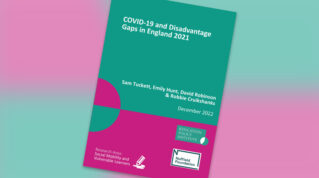The Department for Education is tendering for research into how Covid-19 has impacted students and staff.
The “rapid” data and literature review will consider “harms” on mental and physical health, domestic violence and loss of learning.
Working on behalf of the Scientific Advisory Group for Emergencies (SAGE), the DfE project is worth up to £85,000 and is split across seven sectors, which include: early years; primary and secondary schools; parents/carers; colleges/FE; higher education; and the workforce.
There are specific short and long-term harms to be investigated, which also include changes in earning capacity, the gender and social group imbalance widening, nutrition, educational “knock-on effect”, substance misuse, and wellbeing.
The review will also consider what policies are mitigating against these harms and how effective they are, what else can be done to mitigate against them, and what further research is needed.
The tender reads: “Along with the direct harms of the pandemic, the short- and long-term indirect harms of the pandemic also need to be investigated.
“It is important that we understand these indirect harms, including across different groups, and how they can be mitigated to minimise the negative impact of the pandemic”.
This has been welcomed by organisations which have already completed work in this area.
The Education and Policy Institute’s director of post-16 and skills David Robinson called the DfE’s decision “encouraging,” as: “We have only really started to scratch the surface when considering the impact of lockdowns and the closure of education settings on mental health and wellbeing.”
Young people’s mental health was not in a great shape before the pandemic, with a report from the institute published in January, on how children’s mental and emotional health changed as they moved into adolescence, reporting young people have felt “an increase in levels of worry and pressure as they moved through secondary school”.
The report, based on a survey of 5,000 young people aged 11, 14, and 17, found weight, social media usage, family income, and not feeling safe in their neighbourhood led to increase mental health issues in young people.
Government has become particularly worried about how much learning has been lost during the pandemic. Ministers have so far pledged a more than £1 billion Covid catch-up fund to tackle this issue.
As part of this, colleges have benefited from one-off grants from a £96 million extra tuition fund, which has been used to support small group tuition for disadvantaged students, as well as mental health support services.
Furthermore, former Education Endowment Foundation chief executive Kevan Collins was announced as the government’s new education recovery commissioner this month, with a brief to advise on interventions to catch up the education of students aged up to 19.
This comes after Ofsted, following a series of interim visits to providers last term, published a report of its findings for further education in December, saying leaders had found “gaps” in learners’ knowledge and skills because of the pandemic.
These gaps were most apparent in English and maths, said the leaders, who had also observed learners had lost social skills, the ability to communicate formally, as well as their aspiration.
The watchdog also found “many” leaders had seen the number of learners with “significant” mental health concerns had increased over the course of the pandemic.
As the tender for new research into the harms of Covid is a rapid review, applicants have until 26 February to put in their bids, and those who are successful will have from 29 March to 25 May to deliver a final report, with a skeleton report due in April.

















Your thoughts